1. Pvc Casters or Polyurethane Casters?
The choice between PVC and polyurethane casters is crucial in various industries, impacting mobility, durability, and floor protection. This article explores the differences, advantages, and disadvantages of these materials, offering professional advice on selection for specific flooring types.
2. Understanding PVC Caster
PVC, or Polyvinyl Chloride, is one of the most versatile and widely used synthetic materials in the world. A type of plastic, PVC is renowned for its durability, cost-effectiveness, and adaptability to a wide range of industrial and consumer applications. is a widely used plastic in caster wheel production.
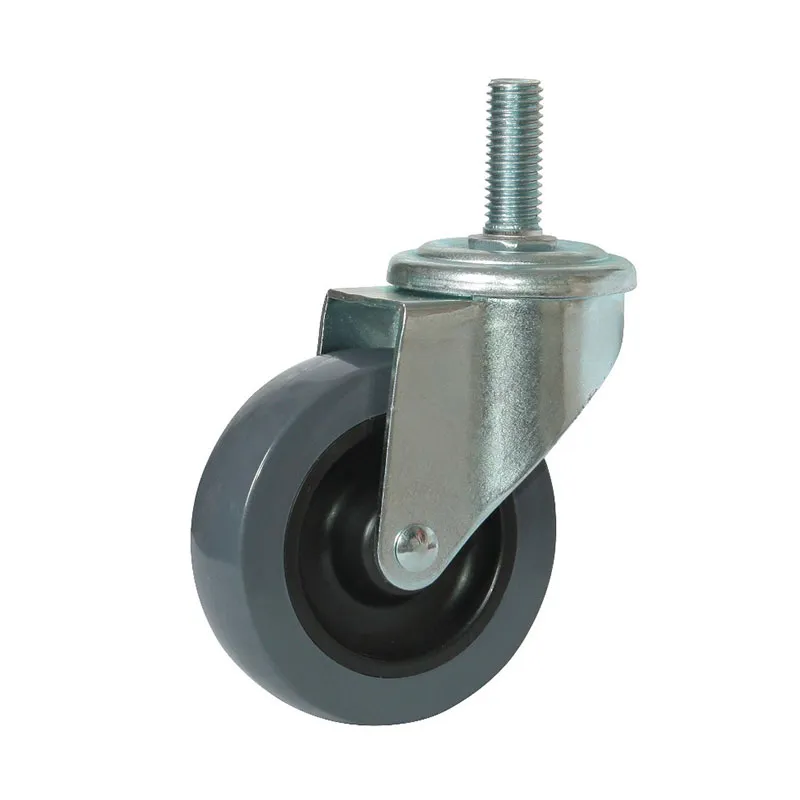
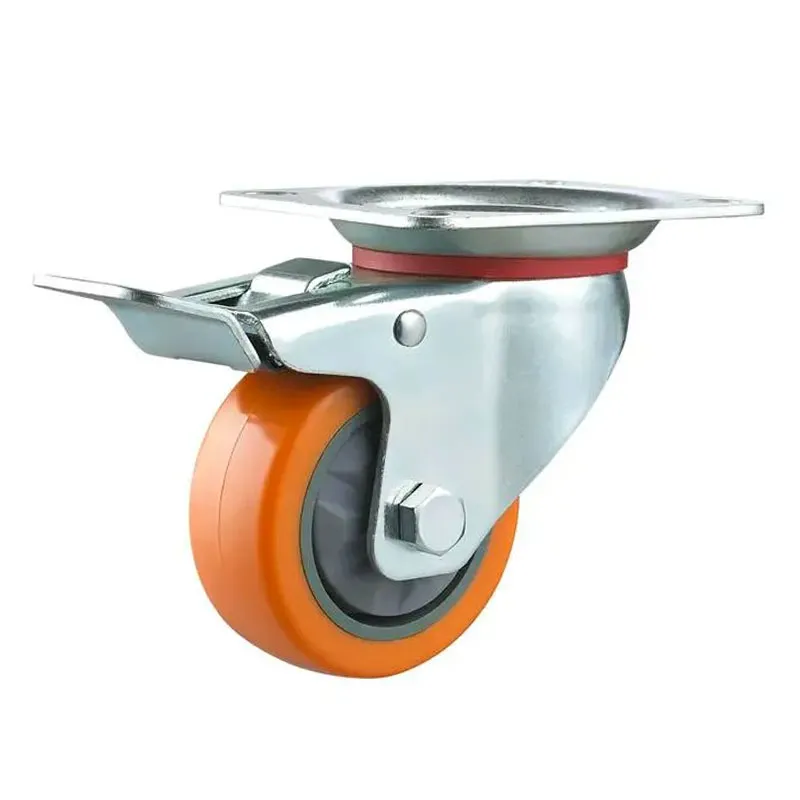
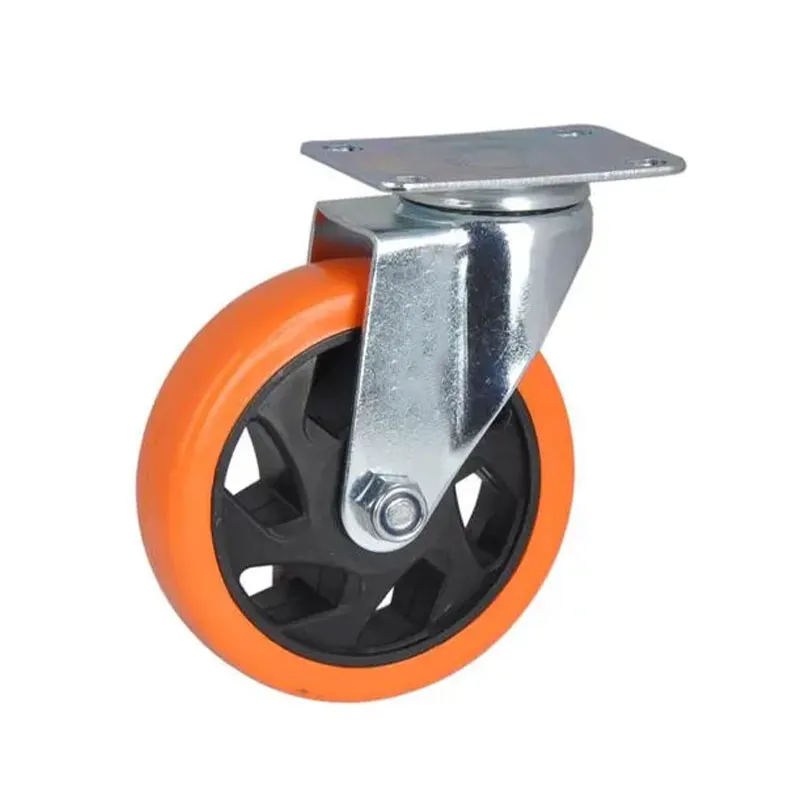
Преимущества:
- Cost-Effective: PVC casters are generally less expensive than their polyurethane counterparts.
- Good Chemical Resistance: They resist most acids, alkalis, and alcohol.
- Lightweight: PVC casters are lighter, making them suitable for light-duty applications.
Недостатки:
- Limited Load Capacity: They are not ideal for heavy-duty applications.
- Poor Heat Resistance: PVC can degrade at higher temperatures.
- Less Floor Protection: This can leave marks on sensitive flooring surfaces.
Applicable Flooring Types:
- Ideal for carpeted or tiled floors where load requirements are minimal.
3. Exploring Polyurethane Casters
Polyurethane is a highly versatile and durable synthetic material widely utilized across numerous industries due to its exceptional properties. It is a polymer composed of organic units joined by urethane links, which can be tailored to achieve a vast range of consistencies and functionalities. a versatile polymer, that offers unique properties for caster wheel manufacturing.
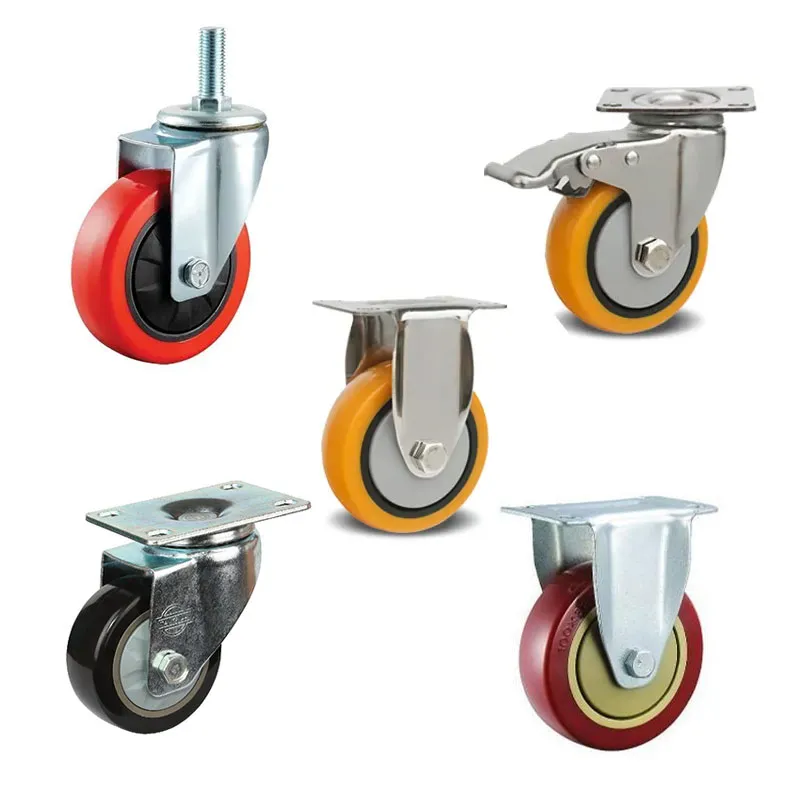
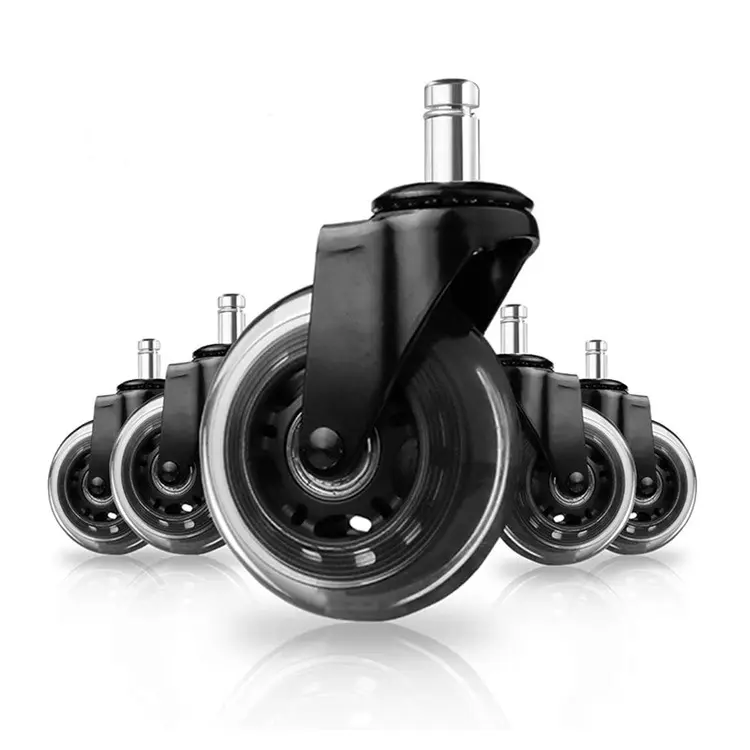
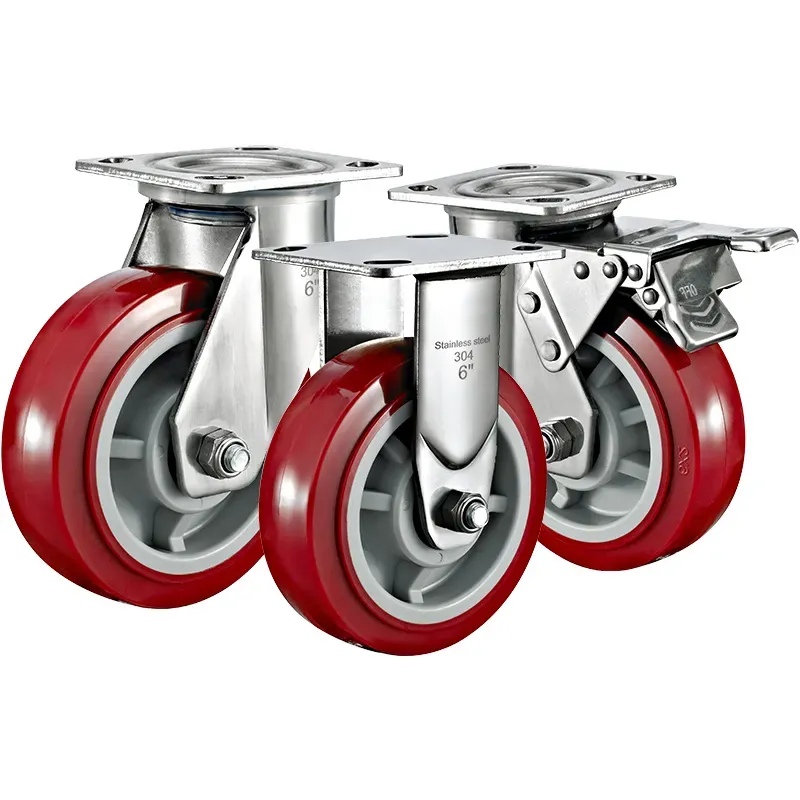
Преимущества:
- High Load Capacity: Suitable for heavy-duty applications.
- Floor Protection: Non-marking and safe for hardwood and epoxy floors.
- Longevity: Resistant to abrasion, wear, and tear.
Недостатки:
- Higher Cost: More expensive than PVC casters.
- Weight: Generally heavier, which might be a consideration for manual handling.
- Sensitivity to Certain Chemicals: Can be degraded by certain solvents or chemicals.
Applicable Flooring Types:
- Best for industrial floors, hardwood, and surfaces where durability is a priority.
4. PVC vs Polyurethane Casters
When choosing between PVC and polyurethane casters, it’s essential to understand how each material performs under different conditions. This comparative analysis highlights the key factors that differentiate these two types of casters, helping you make an informed decision based on your specific needs.
1. Load Capacity and Durability:
- PVC Casters: Ideal for light to medium loads, PVC casters are more suited for applications where the weight of the equipment is not excessively high. They are not as durable as polyurethane and may wear out quicker under constant use, especially in industrial settings.
- Polyurethane Casters: Designed for приложения для тяжелых условий эксплуатации, polyurethane casters can support higher-weight loads without deformation. They are significantly more durable, making them a better choice for equipment that is frequently moved or subjected to heavy loads.
2. Floor Compatibility and Protection:
- PVC Casters: While they work well on carpets and tiles, PVC casters can sometimes mark or scratch hardwood or delicate floor surfaces. They are less ideal for environments where floor protection is a priority.
- Polyurethane Casters: These casters are known for being floor-friendly. They are less likely to leave marks or scratches, making them suitable for a wider range of floor types, including hardwood, epoxy, and even sensitive flooring.
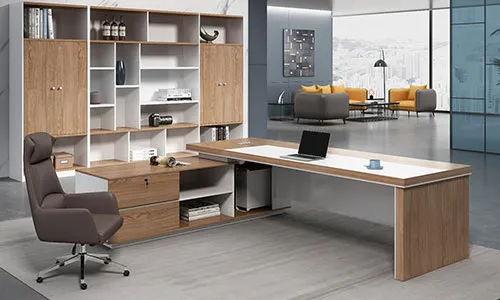
3. Environmental Resistance:
- PVC Casters: PVC has good resistance to chemicals, making it a suitable option for environments where exposure to substances like acids, alkalis, and alcohols is common. However, they are less resistant to high temperatures.
- Polyurethane Casters: Polyurethane is highly resistant to wear, tear, and abrasion. This makes them more suitable for environments with rough surfaces or outdoor use. However, they can be sensitive to certain chemicals and solvents.
4. Noise Level and Comfort of Use:
- PVC Casters: These casters can be noisier when rolling, especially on hard surfaces. The noise level might be a consideration in environments such as hospitals or offices where quiet operation is preferred.
- Polyurethane Casters: They generally provide smoother and quieter operation, making them ideal for use in noise-sensitive environments. Their shock-absorbing properties also contribute to a more comfortable user experience.
5. Cost and Value:
- PVC Casters: Generally more affordable, PVC casters offer a cost-effective solution for легкие приложения. They provide good value for short-term use or when budget constraints are a significant factor.
- Polyurethane Casters: Although they are more expensive, the long-term value of polyurethane casters is higher due to their durability and versatility. They are a worthwhile investment for heavy-duty use and in scenarios where long-term performance is required.
5. Professional Purchasing Advice
Selecting the right casters for your equipment is not just a matter of choosing between PVC and polyurethane. There are several other critical factors to consider to ensure that you make the best choice for your specific needs. Here’s some professional advice to guide you in your purchasing decision:
1. Assess Your Load Requirements:
- Understand the Weight: Consider the total weight your casters will need to support. This includes the weight of the equipment and any additional load it will carry. Ensuring your casters can handle this weight is crucial for safety and durability. #calculate the caster load capacity you need.
- Consider Load Distribution: Think about how the weight is distributed across the casters. Uneven distribution can lead to premature wear and potential failure.

2. Evaluate the Flooring Type:
- Floor Surface: Different floors require different types of casters. For instance, softer casters are generally better for hard floors to prevent damage, while harder casters are ideal for soft floors like carpets.
- Floor Condition: Also consider the condition of the floors. Rough, uneven surfaces may require more durable casters like those made from polyurethane.
3. Consider the Operating Environment:
- Indoor vs. Outdoor Use: Outdoor environments may require casters with higher resistance to elements like water, UV, and varying temperatures.
- Exposure to Chemicals: In environments where chemicals are used, such as laboratories or manufacturing plants, the chemical resistance of the caster material is vital.
4. Think About Maneuverability and Noise:
- Ease of Movement: The caster design (swivel vs. rigid) affects how easily the equipment can be maneuvered. Swivel casters offer more mobility but may require more space to turn.
- Соображения по поводу шума: In environments like hospitals or offices where noise is a concern, opt for casters that operate quietly.
5. Longevity and Maintenance:
- Durability: Consider how often the casters will be used. Frequent use requires more durable materials that can withstand wear and tear.
- Maintenance Needs: Some casters require more maintenance than others. Check the ease of cleaning, lubrication needs, and availability of replacement parts.
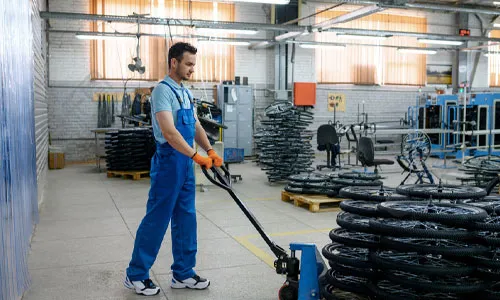
6. Budget Constraints:
- While it’s important to consider cost, the cheapest option may not always be the most cost-effective in the long run. Balance initial cost with expected lifespan and maintenance needs.
7. Seek Expert Consultation:
- Professional Guidance: If in doubt, consult with a caster expert. They can provide tailored advice based on your specific requirements and help you navigate the wide range of options available.
By taking these factors into account, you can make a well-informed decision that balances performance, durability, and cost. Remember, the right caster not only improves the functionality of your equipment but also protects your investment in the long term.
6. Conclusion
Selecting the right caster, whether PVC or polyurethane, is pivotal for optimal performance and longevity of your equipment. PVC is ideal for light-duty and budget-conscious applications, while polyurethane suits heavy-duty uses and floor protection needs. Consider factors like load capacity, floor type, and environmental conditions. A well-chosen caster not only enhances functionality but also ensures safety and efficiency. For the best results, always weigh your specific needs against the characteristics of each caster type, and don’t hesitate to seek Булкастер professional advice for a tailored solution.
Ready to roll with the right casters? Don’t let indecision slow you down! Please свяжитесь с нами сегодня for personalized caster solutions and competitive quotes. Our experts are here to support you every step of the way – ensuring you make the best choice for your needs. Reach out now and experience unparalleled service and quality!


